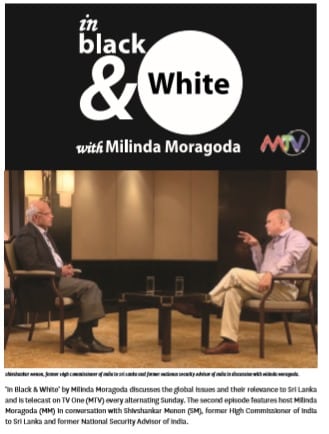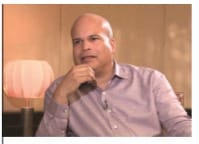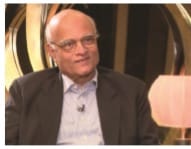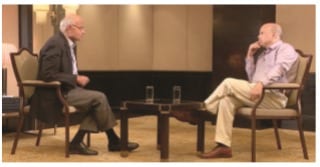
MM: Our last interaction was 20 years ago, and here we are again.
SM: Yes, it has been quite some time.
MM: I know you went from high office to high office since you left Sri Lanka as the High Commissioner, 20 years ago. What was your career path?
SM: I was sorry to leave Sri Lanka because we were content and happy here. I went to China, and then to Pakistan as High Commissioner. After that, I returned home to India as Foreign Secretary. One of the beautiful parts of that was that it brought me back in touch with Sri Lanka. I served as the National Security Advisor from 2010 to 2014 in Delhi. Again, we had some work to do together.
MM: The office of National Security Advisor, is a position that holds much interest for many people internationally because it is very high profile. Whether the position is in India or the US or elsewhere, what are the responsibilities of the National Security Advisor?
SM: We were the first Parliamentary system to introduce a National Security Advisor, a sort of a National Security Counsel. The motivation is primarily that today, you have security, foreign policy, and national security issues across all traditional divisions of government and ministries. For example, cybersecurity, it is everyone’s business, but it is also no one’s business. As such, it would be best if you consider a holistic view of national security. The National Security Advisor is, in our case the advisor to the Prime Minister; in the US, he is the advisor to the President – to the executive head of the government. He, therefore, tends to also become a diplomatic advisor to the head of government. They are the direct channel to other heads of government through the NSAs. There are not that many NSAs in the world. It is a small club of people who deal with national security at the highest level taken into view. They also perform the general functions that are expected from them.
MM: Is there a global network among the NSAs?
SM: There isn’t a formal organization, but most NSAs know each other. One would pick up the phone and talk to the other.
MM: If I may, in your period in office, what was one of the most interesting or decisive moments as NSA or Foreign Secretary? I am aware you were involved in both roles.
The Motivation Is Primarily That Today, You Have Security, Foreign Policy, And National Security Issues Across All Traditional Divisions Of Government And Ministries. For Example, Cybersecurity, It Is Everyone’s Business, But It Is Also No One’s Business. As Such, It Would Be Best If You Consider A Holistic View Of National Security.
The Motivation Is Primarily That Today, You Have Security, Foreign Policy, And National Security Issues Across All Traditional Divisions Of Government And Ministries. For Example, Cybersecurity, It Is Everyone’s Business, But It Is Also No One’s Business. As Such, It Would Be Best If You Consider A Holistic View Of National Security.
SM: It is tough to pick one or two. Frankly, I enjoyed all my postings in each of those jobs. I was fortunate in the positions that I was offered. As Foreign Secretary, of course, one thing that took much effort was the India-US Civil Nuclear Agreement. It was quite a complicated task to work through both in India and the US, and it was a breakthrough effort as well. As National Security Advisor, much of what you do stays quiet, by the nature of the job. However, in our time we made a real beginning in cybersecurity as well as in areas that would not otherwise get public attention. These are today the foundation of our world, which do not get too much public attention.
MM: Today if you were to look at the challenges, when it comes to India, from a national security standpoint, you mentioned cybersecurity. But what are the other challenges?
SM: We are actually in an interesting position. There is no external existential threat towards India anymore. There might have been times in the ‘50s and ‘60s when people wondered about India’s future, but not now. Today, because India has grown and changed, and its capabilities have grown, it is all about internal security issues, because society has changed so fast. All the indices of violence in India, whether it is terrorism, deaths, security forces, left-wing extremism, all those have gone down steadily in this century. Except for two things. Crimes against the person – which is a form of social violence, for example, rape; this is against individuals. Partly this is because of dislocation, urbanization, and of people being outside their traditional family, clan and, village. In another five years or so we could very well be 50 percent urban. It should be a massive shift. Traditional policing will no longer work in those circumstances. Traditional policing was designed for a society where one’s mobility was limited. People had one job and were committed to it all their lives. They stayed in one place all their lives, and they were a part of a social network which existed physically. However today, that is no longer true. We are atomized individuals. You could see the effect of social media in the way it has brought emotion into politics. In the way it has made things more volatile and unpredictable. It also has enormous security implications. Therefore cybersecurity becomes essential. Holistically there is a clutch of internal security issues that I would say today require the most attention. This is true of most societies. China, in fact, today spends more on internal security than it does on national defense.
MM: When it comes to the neighborhood, it is always challenging for any big power to address the issues across the border I presume. In the post-cold war paradigm, India probably has a more significant responsibility within the neighborhood as well. What would you say if you were to do an assessment? If it is permissible to talk of what India has done right, what India has done wrong, and what are the lessons to be learned for the future?
SM: It took us a long time in the subcontinent to understand that we need to integrate economically. That we do best when we work together as economists. And it took until ‘85 for us to start SAARC. Even then it limped along in the beginning. India and Sri Lanka set the right example when we did the FTA that was negotiated between ‘97 and 2000 and was also enforced in 2000. As as a subcontinent, we are quite amazing. Officially we only do six percent of our trade with each other. We are not very integrated. If you look at everything else, our borders are porous, and we have crossed border ethnicity across each of our borders. None of our borders is an ethnic boundary, whether it is between India and Sri Lanka, India and Bangladesh and all the others. The actual trade which we legally call smuggling is twice as much as the official trade. With Nepal we have completely opened the border, with Bhutan, trade is entirely free, and with Bangladesh most trade is duty-free. We are heading in the right direction. If you look at the last decade or so, we have all done very well, especially Sri Lanka and Bangladesh. Sri Lanka got a peace dividend as well. The only reason that Sri Lanka was able to get through 26 years of civil war with positive growth rates every year except one, and Nepal survived 12 years of civil war was partly because we did one thing right; we opened our economies to each other. Moreover, we took each other along. I believe that it is the way to go to look at how we integrate. Ours are new states in a historical sense. Most of us have built our sovereignty and our sense of nationhood. As we are located nearby and also similar, the affinities are very strong. There is a need to, therefore, reinforce that sense of nationhood, communities, and people. We have to recognize the sensitivity on the political, and the sovereignty of each of the countries.
If You Look At South Asia Globally, And Compare It With The Rest Of The World, During The Last Two Decades We Have Probably Done Better Than Most Regions. We Have Done As Well, If Not Better Than East Asia Even.
On that issue, I am not sure we have shown the sensitivity that we should — we, meaning all of us, not just India. There needs to be balancing to integrate economically, socially, to travel, and make communications easy. It is beneficial for all of us, and it serves us all. However, at the same time, you do not want to threaten people’s identity. You do not want to question their nationhood or their sense of sovereignty because these are new concepts. People want to keep in touch with these concepts, especially in an era of mass politics in most of our countries. If you look at it, democracy has spread considerably in the last 20 years throughout the subcontinent. As for me, I believe we are heading in the right direction. There are things we could have done better, but I am an optimist. If you look at South Asia globally, and compare it with the rest of the world, during the last two decades we have probably done better than most regions. We have done as well, if not better than East Asia even.
MM: What is the future when it comes to SAARC?
SM: I think we have been too obsessed with ‘which’ organization. We have to consider the ‘how.’ For me, it is the outcome and the substance that matters. Whether we do it through SAARC or whether we do it bi-laterally, or sub-regionally, three of us, five of us, BIMSTEC or anything, whatever works, works.
MM: You feel it should be flexible?
SM: Yes, be flexible and pragmatic. If it works, it works. If it does not work, find another way of doing what you want to do.
MM: India is a nuclear power. Of course, you are also surrounded, by existing powers and aspiring powers.
SM: Yes, this is the most nuclearized part of the world.
MM: What is the future? Because if you look at the United States, to some extent there seems to be revisionist thinking as well. There was a tendency to try and move away from nuclear weapons, but where do you see the future?
SM: Yes, the region is heavily nuclearized. If you look at all the states possessing nuclear weapons, they are present or active in the Indian ocean, and the Asian continent itself. There is Russia, China, India, Pakistan, and there are undeclared nuclear states such as Israel. Moreover, the US does not confirm or deny whether nuclear weapons are in the region at all. Therefore yes, it is heavily nuclearized, but there has been a taboo against nuclear weapons since 1945 which no one has broken. It is because people increasingly realize that nuclear arms deal with one end of the spectrum. They are to neutralize other nuclear weapons. However, they are not the answer to any other parts of the spectrum of violence. It is not the answer to conventional warfare, or asymmetric, or other forms of warfare, including whether it is cross border terrorism or not. I believe the function of nuclear weapons is to make sure that other nuclear weapons cannot be used to threaten you to change your behavior. That is why I believe India and China are willing to say no to first use. They are not going to use nuclear weapons to try to compensate for a conventional imbalance, or use it as an umbrella for some other thing they might want to do. I believe that is increasingly the function, to that extent. As long as deterrents works and nuclear weapons prevent the use of other nuclear weapons, that is not a bad state to be. So far at least I assume that people are not suicidal. While threats might be made and things are said, at least that taboo against the use has helped.
MM: Today in a general sense, with international relations experts, you have the pessimists, and you have the optimists. Where do you stand on that scale?
SM: I have to only think of where the world was when I was born and where it is today. When I see where India was when I was born and where it is today, I cannot help but be an optimist. When I look around me, more people are living better, longer, healthier, they lead more productive, more comfortable lives than ever before in history. Yes, there are threats. However, then we have always had threats. I mean human beings have always had trouble getting along with each other. We have had struggles for power, and for dominance. We have handled them in the past. I do not see why we cannot do that now as well. For me, at least my experience suggests that you should be an optimist. However, there’s a whole industry in pessimism. There are entire sections in the formal structures of the state whose only job is to think negatively and anticipate negative prospects. Their budget and position depend on it. Therefore, there will always be this worry and scare.

When I Look Around Me, More People Are Living Better, Longer, Healthier, They Lead More Productive, More Comfortable Lives Than Ever Before In History. Yes, There Are Threats. However, Then We Have Always Had Threats.
MM: You made a point earlier on about moving away, at least thinking outside the traditional structures such as SAARC and others. That makes sense because we have entered a new world technologically. When you look at India, you have diaspora all over the world.
SM: Yes, 30 million people scattered around the world.
MM: In the new context, how should we organize ourselves on a global level? Is the United Nations still relevant in that context if we are talking about SAARC? If yes, how is it relevant?
SM: I believe its relevance is becoming less and less. The UN is an organization of states. It is a hierarchical organization which tried to freeze the hierarchy that existed after World War II. That is having the five veto powers, by having a Security Council which takes decisions for other people and so on. Today’s world is increasingly flat for various reasons. The distribution of power is no longer what it was then. If you look at it objectively, thanks to Japan, the rise of China, and other emerging economies – India is now the fifth or sixth largest probably. The world is multipolar economically. After all, commodity markets, prices depend on what happens in several places, not just in one country. The US’ share of the world GDP is still roughly about 25 percent, and it has stayed there. However, Europe share has decreased steadly.

China is now around 18 percent or so, and therefore if you add China and India together in GDP terms, we are equal to or a little more than the US in the global economy. Consequently, the world is multipolar economically. Militarily, the world is unipolar. The Royal Navy used to have two Navy standard. They wanted to be bigger than the next two Navies put together. The US Navy is equivalent to the next 16 Navies put together. It is a 16 Navy standard. US defense budget is equivalent to that of eight countries put together. It seems that the world is unipolar militarily, and multipolar economically. Politically, the world is thoroughly confused. If I were to ask what is the world order today, politically, no one has an answer. We are at a moment of disjuncture, of a sort of face change. The role of the state is less and less what it used to be. Whether it is assigning domain names, ICAN does it, and private corporations do it. Where there is an energy flow, and a flow of information, then you know the big four technology companies. If we include the Chinese, then we have the big nine. We were discussing maritime security previously. Ninety-three percent of our information flows via the internet, through undersea cables. There are no jurisdictions involved here. It is an entirely different world where things are decided between corporations, between individuals and ideas flow freely. You can’t control this. There’s a massive social churn going on as well.
Politically, The World Is Thoroughly Confused. If I Were To Ask What Is The World Order Today, Politically, No One Has An Answer. We Are At A Moment Of Disjuncture, Of A Sort Of Face Change. The Role Of The State Is Less And Less What It Used To Be
MM: In that context, I suppose states have some regulatory responsibility with this whole argument on Facebook, Google, and Amazon coming up. How does one cope with that without becoming overly repressive and oppressive?
SM: Regimes which want more control tend to say, ‘under sovereign control and within sovereign boundaries we have complete sovereignty.’ However, that is not technically possible: even the great firewall can be breached. It is breached every day by millions of people. The problem is that we do not have a model of internet governance that is acceptable across the world. There are at least three ideas. Multiple stakeholders, which is the American and the Indian idea, for instance, of letting those who have stakes in the system to run it, and take decisions. The other extreme, which is what Russia and China would prefer, is mainly for sovereign governments to have control and make those decisions. Finally, there’s the European model in between which tries a sort of supranational organization, but still an organization of states which will stipulate regulation. I’m not sure where we will go. Ultimately the decision will be taken by the people, individuals; individual choices adding up to a collective decision and by how technology evolves. Technology can not be controlled. When we talk of governance, it’s not governance in the traditional sense that is applied in this instance.
MM: But do you feel that when it comes to the UN, the debate will always be there about the Security Council? It was an institution for another time.
SM: I am a minority in India. I believe it is a waste of time chasing the Security Council.
MM: When you move to the new paradigm that is in terms of technology, do you feel the mechanisms that are available to regulate will be effective without going back to the UN type of structure? Would they be more open, allowing countries like India to have a say?
SM: It seems like this will evolve, just like markets evolve. They want the product of one brilliant mind or one government saying, ‘This is how markets will work.’ You look at commodity markets. It should do a pretty efficient job. The way we distribute taxes within our society, how much is used by whom. These are things that have evolved as a result of several small decisions aggregated over time.
MM: Do you feel that people will sort it out?
SM: We will have to. Because people will make mistakes, and when that does not work, they will have to find another way of dealing with it.
MM: I was reading an article recently in the Washington Post by Robert Kagan.
SM: ‘Return of the Jungle’.
MM: Exactly, and ‘The Strong Man Strikes Back’.
SM: I agree with him that we have a phenomenon of new authoritarians. That has been going on. It is probably a consequence of globalization. That is because globalization in many societies such as India, China, Japan, and even the US represented a threat to identity. The idea is that foreign aspects are suddenly in your living room or the palm of your hand on your smartphone. You feel, therefore you have to assert your own identity when you assume foreigners were taking your jobs. You have new authoritarians, so-called populists – they are not actually populists – who would then offer solutions and say “I’m a strong leader, I’ll fix this.” None of them have shown the ability to fix it yet. But it started in Asia, with Xi Jinping, Narendra Modi, and with Vladimir Putin. I believe the US was probably the last to do it with the election of Donald Trump. However, you do have new authoritarian leadership in the world, who have made great promises. At what stage do people ask, ‘what happened?’ I’m not sure where this is going to end politically. Because you are torn, you are in a globalized world whether you like it or not. For most of us, our economies depend on the rest of the world. We are connected in multiple ways, not only through trade and investment, but by technology, our ideas, and the medium that we are using, which are all global. We are in a globalized world, but you want to maintain your local identity. You want to strengthen it; you want to defend it. You want jobs to be kept local. You are fighting digital manufacturing, Artificial Intelligence, and all these changes that you can see, the energy revolution: all these are global phenomena. I am not sure how we are going to resolve that tension.
MM: I agree with you. Maybe we are shifting in another direction because people are not sure where to go. Clearly, personal security is fundamental and also a sense of predictability around you. I suppose technology is increasingly removing that from us. How would you achieve the balance required?
SM: I have a simple example. Our ideas of privacy have changed completely, and they have evolved in the last 20 years. In the old days, no one had an idea about emails. Gentlemen did not read each other’s letters. Now, your email is open, and you assume that everyone will read your mails, including any government, any individual, any corporation. At present, we write differently because of that assumption. We have made that adjustment already in our minds. All these things we do on social media, these activities that many people use social media for, they couldn’t do it 20 years ago. We have changed our ways of working, our ways of living, our ways of thinking, and interacting with each other. I believe that will continue. We take it for granted that we are in a globalized world. The real problem is going to come out of a different set of factors. If you look at megacities, and their growth, there are about 43 cities in the world with over ten million people. Seventy percent of the world’s population lives within 200 miles to the sea. You have global warming, climate change, and rising sea levels. Humanity is being concentrated physically into smaller and smaller spaces. When you look at urbanization, it is a very different situation. The sense of personal space, freedom, and the ideas that we were brought up on are being challenged. We are going to have to live very differently. We are going to have to organize our politics differently too. Politics then become the politics of emotions, of the mob, of sudden waves of feeling rather than the traditional politics. Social media and other technological trends make it all possible.
MM: How has diplomacy changed since you started your career?
SM: Diplomacy is fundamentally the same. You have different tools and means of communications, and you have other responsibilities of various nature. However, the primary task of a diplomat is to negotiate an outcome which works for both sides. If the other side has no interest in the outcome, they’re not going to implement it. Then it’s of no use to you. Winning 100 percent is no use. It would be best if you had both parties agree through negotiations peacefully, without forcing an outcome which works for both of you. It is fine to have different proposals, but you have to leave the table with something. That job is something only individuals and people can do. No machine is going to take that over.

MM: The embassy is as relevant as ever?
SM: Yes, we still need one. It is possible to do a lot more now by flying in, flying out, by talking to people using these new means of communications and technology which makes your job easier. However, ultimately, you still need to do the hard work. It is still a people’s job, just like politics. I do not think politicians or diplomats are in any danger of losing their jobs.
MM: If a young person wants to start a career in diplomacy, and come to you for advice, what would your advice be to him or her?
SM: I love this career. I did not mean to be a diplomat. I was reading for a PhD in Ancient India in China. I just wanted to see the country when I tumbled into the job. I love this, and as such, I am very biased. I would immediately encourage anyone who wants to pursue a career in the diplomatic service. However, there are three factors to consider. One, as I said, it’s a people business. If you are not gregarious, if you do not enjoy people, I think you know then it is not the profession for you. That’s the first factor. Secondly, you must enjoy change, different places, and travel. It is physically quite demanding as a profession. It doesn’t seem so when you are young, but as you get older, it does. However, if you like those two things then it’s the ideal profession.
You Have To Keep An Open Mind. Not Everyone Is Going To Think Like You Or Be Like You. If You Enjoy The Process Of Understanding Other People, Working With Other People, Getting Them To See Things Your Way, Then It Is The Ideal Profession.
You have to keep an open mind. Not everyone is going to think like you or be like you. If you enjoy the process of understanding other people, working with other people, getting them to see things your way, then it is the ideal profession. Those basics have not changed. It is interesting if you go back and read the old texts, and go back to Kautilya and philosophers of the past, what a diplomat does today is still the same. It is quite remarkable how similar it is. When you go back to Nicolson, a big name of the last century, it’s still the same what we do. I find it quite amazing, to be frank. ‘In Black & White’ with Milinda Moragoda The program is telecast on alternate Sundays on TV One, at 8.30pm. It will be rebroadcasted with Sinhala and Tamil subtitles on Sirasa and Shakthi. In Black & White is directed by Fredrick Dissanayake. Future guests will include Lord Jonathan Marland, former UK Minister, Conservative Party Treasurer and Present Chairman of the Commonwealth and Investment Council.
Milinda Moragoda’s regular Sinhala program ‘Milinda Samaga Niyamarthaya’ will be telecast every Saturday at 6 am on Sirasa TV and repeated at 5 pm on TV One






